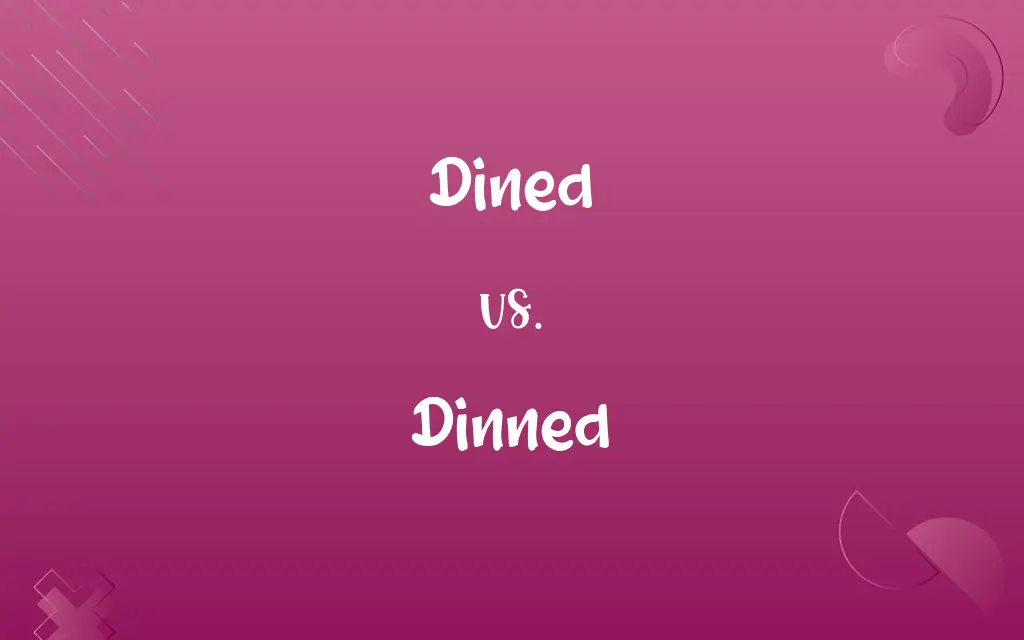Dined vs. Dinned: Know the Difference

By Shumaila Saeed || Updated on December 25, 2023
"Dined" means to have eaten a meal, especially dinner, while "dinned" is the past tense of "din," meaning to make a loud, unpleasant, and prolonged noise.

Key Differences
"Dined" is a verb that refers to the act of eating a meal, particularly a formal or elaborate one. It is often associated with social or ceremonial occasions. In contrast, "dinned" comes from "din," a noun or verb related to loud, continuous noise. This word is used to describe situations where a cacophony or a persistent sound is present.
Shumaila Saeed
Dec 02, 2023
The usage of "dined" typically implies a certain level of sophistication or setting, such as dining in a restaurant or attending a dinner party. It suggests a certain decorum associated with the meal. On the other hand, "dinned" conveys a sense of auditory assault. It is used when describing scenarios where noise is prominent and possibly annoying.
Shumaila Saeed
Dec 02, 2023
Grammatically, "dined" is the past tense and past participle form of "dine." It is used to talk about past events involving meals. In contrast, "dinned" is the past and past participle form of "din," which means to make a loud noise, or to bombard someone with something repeatedly.
Shumaila Saeed
Dec 02, 2023
The etymology of "dined" is rooted in social customs and the act of eating, originating from the Old French word "disner." Conversely, "dinned" has its roots in the Old English "dynn," related to noise and tumult, reflecting its association with loud, disruptive sounds.
Shumaila Saeed
Dec 02, 2023
In literature, "dined" is often used to set scenes, create atmosphere, or develop characters through their dining habits or experiences. Conversely, "dinned" is used to create a sense of chaos, urgency, or to describe a character's experience of overwhelming noise.
Shumaila Saeed
Dec 02, 2023
ADVERTISEMENT
Comparison Chart
Meaning
To eat a meal, especially dinner
To make or be exposed to a loud, continuous noise
Shumaila Saeed
Dec 02, 2023
Etymology
From Old French "disner," meaning to dine
From Old English "dynn," meaning noise
Shumaila Saeed
Dec 02, 2023
Literary Use
Setting scenes and character development
Conveying chaos or sensory overload
Shumaila Saeed
Dec 02, 2023
ADVERTISEMENT
Dined and Dinned Definitions
Dinned
To bombard someone repeatedly with something.
He dinned his opinions into everyone's ears.
Shumaila Saeed
Nov 26, 2023
Dinned
To fill a place with a loud, continuous noise.
The alarms dinned throughout the building.
Shumaila Saeed
Nov 26, 2023
Dined
To eat the main meal of the day.
He hasn't dined yet, so he's quite hungry.
Shumaila Saeed
Nov 26, 2023
ADVERTISEMENT
Dinned
To make a loud, continuous noise.
The construction noise dinned in his ears all day.
Shumaila Saeed
Nov 26, 2023
Dinned
To be in an environment of constant noise.
They lived in a neighborhood that was constantly dinned by sirens.
Shumaila Saeed
Nov 26, 2023
Dinned
To be subjected to persistent loud noise.
She was dinned by the traffic sounds.
Shumaila Saeed
Nov 26, 2023
Dined
To give dinner to; entertain at dinner
Wined and dined the visiting senators.
Shumaila Saeed
Oct 19, 2023
Dinned
To instill by wearying repetition
Dinned the Latin conjugations into the students' heads.
Shumaila Saeed
Oct 19, 2023
Repeatedly Asked Queries
Can "dined" be used for meals other than dinner?
Traditionally, it refers to dinner, but it can be used more broadly for any main meal.
Shumaila Saeed
Dec 02, 2023
Is "dined" formal or informal?
It can be both, but often implies a more formal or social meal.
Shumaila Saeed
Dec 02, 2023
What part of speech is "dined"?
It's a verb, specifically the past tense of "dine."
Shumaila Saeed
Dec 02, 2023
What is the origin of "dinned"?
It comes from the Old English "dynn," meaning noise.
Shumaila Saeed
Dec 02, 2023
Is "dined" only used in past tense?
Yes, as it is the past tense form of "dine."
Shumaila Saeed
Dec 02, 2023
What does "dinned" mean?
It means to make or experience a loud, continuous noise.
Shumaila Saeed
Dec 02, 2023
Is "dinned" a common word in modern English?
It's less common and more often used in literary or descriptive contexts.
Shumaila Saeed
Dec 02, 2023
Is "dinned" ever used metaphorically?
Yes, it can metaphorically describe being overwhelmed by repetitive information or noise.
Shumaila Saeed
Dec 02, 2023
What is the origin of "dined"?
It comes from the Old French "disner," meaning to dine.
Shumaila Saeed
Dec 02, 2023
Can "dinned" refer to music?
It can, particularly if the music is loud and continuous.
Shumaila Saeed
Dec 02, 2023
How is "dined" used in literature?
It's often used to set scenes, describe social settings, or characterize individuals.
Shumaila Saeed
Dec 02, 2023
Can "dinned" be used in a positive context?
It's typically used in a negative or neutral context, referring to unwanted noise.
Shumaila Saeed
Dec 02, 2023
Can "dined" be used in a business context?
Yes, it can refer to business dinners or meals with colleagues.
Shumaila Saeed
Dec 02, 2023
Can "dined" imply a certain level of cuisine?
It often connotes a higher quality or more formal meal.
Shumaila Saeed
Dec 02, 2023
Can "dined" be used in a historical context?
Absolutely, often to describe historical dining customs or events.
Shumaila Saeed
Dec 02, 2023
Does "dinned" always imply unpleasantness?
Generally, yes, as it refers to loud, often disruptive noise.
Shumaila Saeed
Dec 02, 2023
Is "dinned" used in everyday conversation?
It's more common in written English or descriptive language.
Shumaila Saeed
Dec 02, 2023
Is "dinned" associated with any particular genres of writing?
It's frequently found in genres that emphasize descriptive sensory experiences, like poetry or vivid prose.
Shumaila Saeed
Dec 02, 2023
Share this page
Link for your blog / website
HTML
Link to share via messenger
About Author
Written by
Shumaila SaeedShumaila Saeed, an expert content creator with 6 years of experience, specializes in distilling complex topics into easily digestible comparisons, shining a light on the nuances that both inform and educate readers with clarity and accuracy.









































































